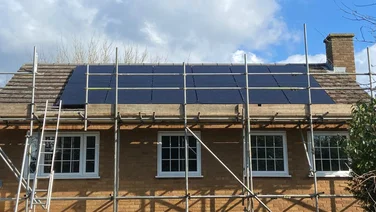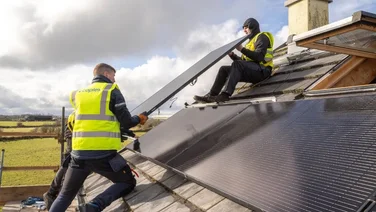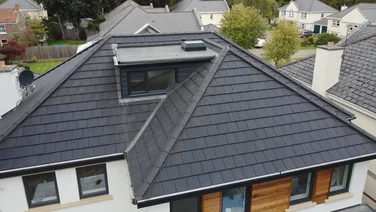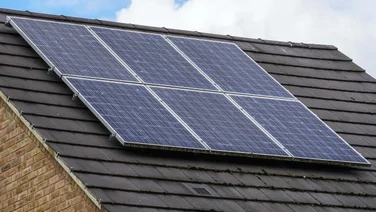- Solar batteries cost about £4,500 on average
- A solar battery will typically last you 10–15 years
- Without a battery, you could lose around 50% of the power your panels produce
Solar energy is becoming increasingly popular, with more than 1.3 million UK households taking advantage of falling solar panel costs to cut their bills and emissions and reduce their reliance on the grid.
Suppose you’re one of the many turning to solar panels. In that case, you’ll want to know the benefits of solar batteries, too – they let you store more of the solar energy you generate rather than letting the excess electricity go to the grid.
But are solar batteries worth it in the UK? We’ll answer that below.
If you’re already set on getting a solar PV system with a solar battery, why not fill in our web form to receive free quotes from trusted installers?
Which solar products are you interested in?
Get startedIs a solar battery worth it in the UK?
Solar batteries are not currently worth getting financially if you want to break even quickly or make a profit.
A battery for a three-bedroom property tends to cost around £4,500, which, combined with the costs of a solar panel system, can be a barrier for many.
However, solar batteries are worth it if you want to reduce your reliance on grid electricity because they allow you to store the electricity generated by your solar panels.
Getting a solar battery with solar panels is worth it to maximize your panels’ electricity. However, it might not be so worth it if you’re purely looking for financial benefit, and you’ll need two within the typical lifespan of your solar panel system.
That means a typical break-even point of around 24 years
- A solar panel system with a solar battery will save a typical three-bedroom home £669 a year
- You can store energy from your solar panels that would otherwise be lost
- Solar batteries help reduce your grid reliance
- You'll need to purchase two solar batteries within your solar panel system's lifespan
- It takes around 20 years to break even on solar batteries
- Some solar batteries must be connected to the internet at all times, or else have their warranty limited

How much money will a solar battery save me each year?
A typical three-bedroom home will save around £669 yearly with a solar battery and solar panel system. This is made up of the savings you’ll make from not buying electricity from the grid and the money you can make exporting electricity to the grid via the Smart Export Guarantee (SEG).
You’ll only receive a maximum of 20p per kilowatt hour (kWh), the rate currently paid out by OVO Energy.
At 24.50p per kWh, electricity is more expensive than you’d get via the SEG initiative. You’ll save money if you simply store your excess energy in your solar battery for later.
The average three-bedroom house with solar panels will generate 2,645 kWh of electricity annually.
Before selling excess power, you will save £648 on your energy bills by not buying 2,645 kWh from your supplier. If you don’t use all that excess electricity and sell it back, your savings will be even higher depending on how much excess you have.
Battery size | Annual savings |
|---|---|
4 kWh | £401 |
8 kWh | £669 |
9.5 kWh | £937 |
Want to get a better idea of what it’s like to own a set of solar panels? Check out our case study with Andrew, based in North Yorkshire.
Andrew had a 3.95 kWh solar panel system installed in June 2022, which cost roughly £6,000. Despite electricity prices increasing around the world, Andrew’s panels are already saving him £32.93 on energy bills. He’s also projected to save around a tonne of CO2 a year with his panels.
Check out the full interview with Andrew to learn more about solar panels.
Which solar products are you interested in?
Get startedHow long does a solar battery last?
A typical solar battery can last around 14.1 years, meaning you’ll need to purchase two within the average lifespan of a solar panel system. You should also be aware that most solar batteries have a certain number of ‘cycles’ when a battery goes from fully charged to empty to fully charged again.
Some batteries have 4,000 cycles, and some can go up to 10,000 cycles. Additionally, solar batteries typically have a warranty of 10 years or, in some cases, a set number of cycles.
How many solar batteries do I need?
To determine how many batteries you need to power your home or what size battery you need, you should calculate your kilowatt-hours (kWh) of use. A smart meter makes this easy, and you can check your monthly energy bill to see how much kWh you consume.
When will I break even with a solar battery?
You will break even on your battery after 24 years, assuming a three-bedroom house with a typical annual electricity consumption.
It takes this long because solar batteries are expensive, averaging at £4,500, and you’ll need to purchase two within the lifespan of your solar panel system.
However, electricity prices have risen sharply recently and show no signs of slowing down, while solar battery costs constantly decrease.
This means that saving all the electricity you generate will be profitable shortly.
What factors influence the return on investment?
Several factors affect the ROI of solar batteries, including battery capacity, battery degradation, and fluctuating electricity prices.
- If your battery capacity is too small, you won’t be able to store as much electricity, which might mean you’ll use an unnecessary amount of electricity from the grid. Consider a battery with a bigger capacity if you live in a larger property.
- Battery degradation impacts ROI, too—the faster a battery degrades, the sooner you’ll have to buy another one. Some batteries, such as the Tesla Powerwall, have low degradation rates, allowing them to be used repeatedly with little issue.
- Fluctuating electricity prices change how slow or fast your battery’s ROI is. When electricity prices are lower, the ROI on a solar battery decreases because using electricity from the grid becomes more affordable. Higher grid electricity prices make storing your energy in solar batteries much more worthwhile.
Solar batteries vs the Smart Export Guarantee (SEG)
You can still sell excess electricity to the grid via the Smart Export Guarantee with solar batteries, but it’s better to save the electricity for later instead.
This is because the current rate of grid electricity is 24.5p per kWh, and the best UK-wide SEG rate is 20p per kWh, so storing the energy rather than selling it makes more financial sense.
Should I get a lithium-ion or a lead-acid battery?
If you’re serious about adding energy storage to your home, you should get a lithium-ion battery. It’s almost always the better option. Lithium-ion batteries last longer, are far safer, and are more cost-effective.
That’s despite being more expensive than lead-acid batteries. You’ll pay less for a lead-acid battery, but the time it takes to degrade compared to a lithium-ion battery means you’ll purchase two within the latter’s lifespan.
How popular are solar batteries in the UK?
With the number of people in the UK adopting solar panels increasing constantly, it makes sense that the number of people who own solar batteries is rising, too. Right now, according to the latest MCS installations data, over 1.2 million households are using solar panels in the UK.
In contrast, the number of homes using solar batteries is currently only around 10,000. This might sound small, but it makes sense when you factor in the average cost of a battery (between £4,000–£8000) and add it to the typical £7,000 cost for solar panels.
However, interest in solar batteries is increasing. A survey in 2019 by Which.co.uk found that just 6% of solar panel owners had their own batteries, but 74% would consider buying one. This is up from the 2018 results, in which roughly 60% of respondents said they’d consider a solar battery.
If you’d like to see the best solar batteries on the market, take a look at our choices.
Summary
- Solar batteries are a worthwhile investment for their convenience alone if you can afford them.
- They’re particularly good if you want a solar PV system to reduce the amount of electricity you buy to the bare minimum.
- Unfortunately, the upfront cost of solar batteries will continue to put them out of reach for a while, but this is slowly improving.
- For now, the simple fact is that solar batteries are expensive, even when factoring in the savings from not buying grid electricity.
- Solar panels, however, have an excellent return on investment, especially as 69% of people are likely or very likely to buy or rent a property with solar panels on it, according to our latest National Home Energy Survey.
For those ready to invest in a solar system, you can simply fill in this webform, and our qualified installers will get in touch.






